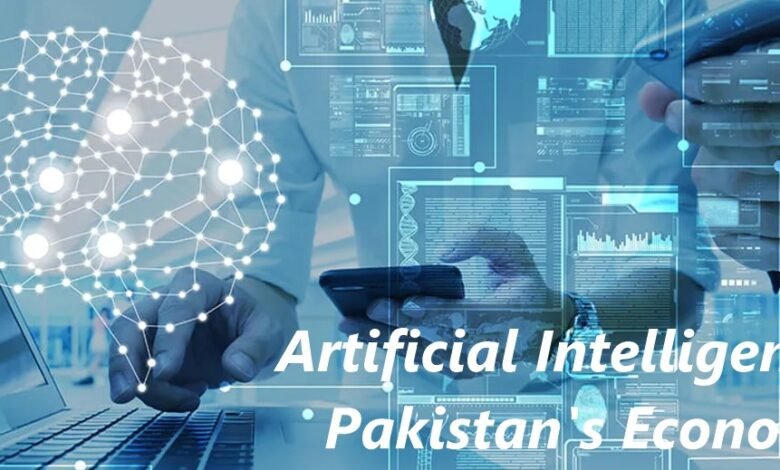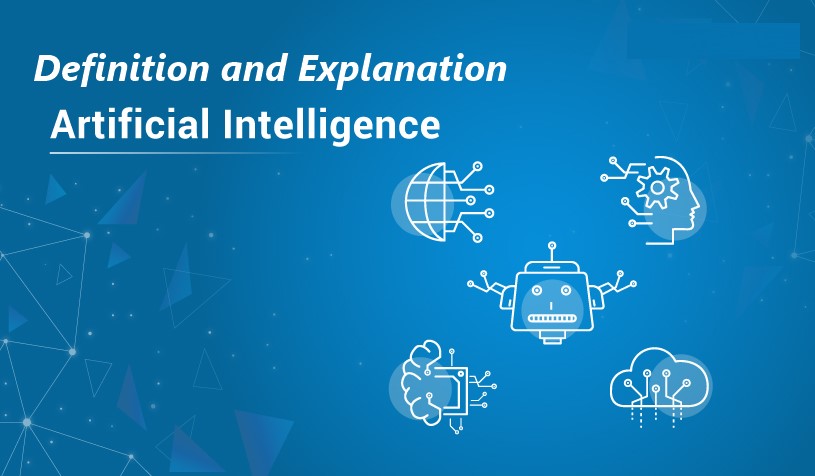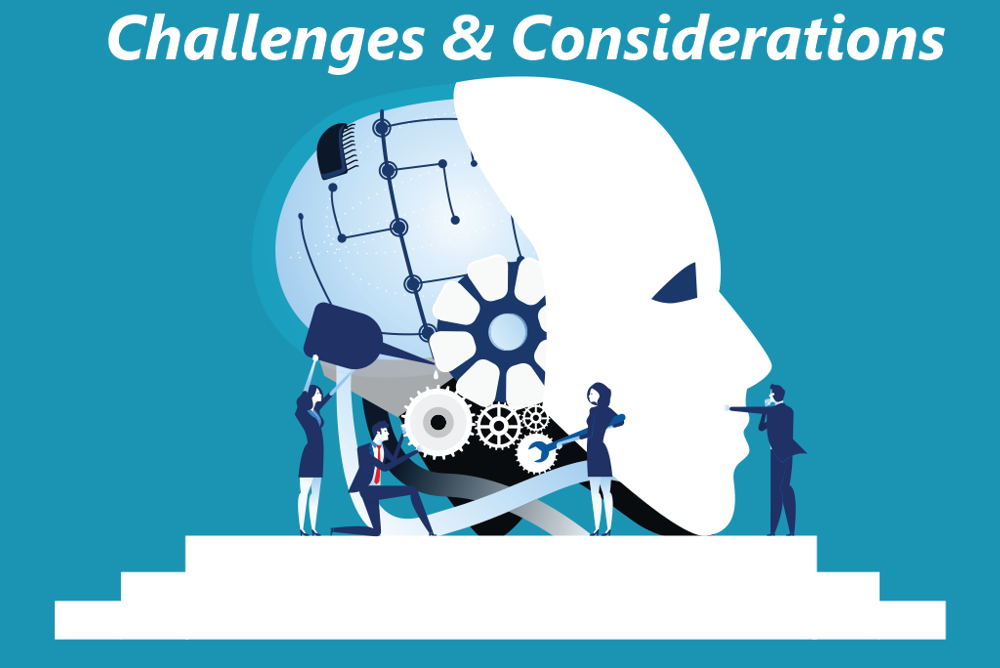The Role of Artificial Intelligence in Pakistan’s Economy 2023

Artificial Intelligence (AI) has emerged as a transformative technology with the potential to revolutionize various sectors of Pakistan’s economy. AI refers to the development of computer systems that can perform tasks that typically require human intelligence, such as visual perception, speech recognition, and decision-making. AI has gained significant momentum in recent years and become a critical driver of innovation and growth.
The adoption of AI technologies in Pakistan can bring numerous benefits, including increased efficiency, productivity gains, cost savings, and improved decision-making. With the right investment, infrastructure, and regulatory framework, AI can pave the way for economic development and competitiveness on both domestic and global fronts.
Read More: Future of Robotics: Artificial Intelligence and Robotics 2023
Definition and Explanation of Artificial Intelligence (AI)

Artificial Intelligence (AI) refers to the development of computer systems that can perform tasks that typically require human intelligence. Without explicit programming, these systems are designed to analyze vast amounts of data, recognize patterns, make decisions, and learn from experience. AI encompasses various subfields such as machine learning, natural language processing, computer vision, and robotics.
Importance and Potential of AI in Pakistan’s Economy
AI holds immense importance and potential in shaping Pakistan’s economy in 2023 and beyond. Its ability to rapidly process and analyze large volumes of data can help businesses and organizations make data-driven decisions, optimize operations, and create innovative products and services. By harnessing the power of AI, Pakistan has the opportunity to drive economic growth, improve efficiency, and foster competitiveness on both domestic and global fronts.
Impact of AI on Different Industries
Healthcare Sector

Enhanced Diagnostics and Personalized Treatment AI technologies can analyze medical data, including patient records, lab results, and medical images, to aid in disease diagnosis and treatment. Machine learning algorithms can identify patterns and anomalies in medical data, enabling earlier detection of diseases and personalized treatment plans.
Efficient Healthcare Delivery and Resource Allocation AI can optimize healthcare delivery by streamlining administrative tasks, automating routine processes, and improving resource allocation. AI-powered systems can assist in patient triage, appointment scheduling, and managing healthcare resources, leading to improved efficiency and better patient outcomes.
Agriculture Sector
Optimized Crop Management and Increased Yields AI can revolutionize agriculture by enabling farmers to make informed decisions about crop management. By analyzing data on soil conditions, weather patterns, and crop health, AI systems can provide recommendations for optimal irrigation, fertilization, and pest control, resulting in higher yields and reduced resource wastage.
Precision Agriculture and Sustainable Practices AI-powered technologies like drones and sensors can monitor crop health, soil moisture, and nutrient levels in real-time. This enables farmers to implement precision agriculture techniques, such as targeted spraying and irrigation, minimizing environmental impact and promoting sustainable farming practices.
Finance Sector
Fraud Detection and Risk Management AI algorithms can analyze large volumes of financial data, identify patterns of fraudulent activities, and detect anomalies in real time. This helps financial institutions in preventing fraud, mitigating risks, and safeguarding customer assets.
Improved Customer Service and Personalized Banking Experiences AI-powered chatbots and virtual assistants can provide personalized customer support, answer queries, and offer tailored recommendations. By leveraging natural language processing and machine learning, banks can enhance customer engagement, improve service delivery, and create personalized banking experiences.
Manufacturing Sector
Automation and Increased Productivity AI-driven automation can optimize manufacturing processes by reducing human errors, increasing production efficiency, and enabling predictive maintenance. AI-powered robots and smart machines can perform repetitive tasks with precision, leading to improved productivity and cost savings.
Predictive Maintenance and Supply Chain Optimization AI-based predictive analytics can analyze data from sensors and machines to identify patterns and predict equipment failures. This enables proactive maintenance, minimizing downtime, and optimizing supply chain operations by ensuring the timely availability of raw materials and finished products.
Challenges and Considerations

Skilled Workforce and Talent Development The adoption of AI require a skilled workforce proficient in AI technologies. Pakistan needs to invest in educational programs, research, and development initiatives to cultivate a pool of AI professionals capable of driving innovation and implementation.
Data Quality, Privacy, and Security AI rely on high-quality data for training and accurate decision-making. Ensuring the availability and integrity of data while maintaining privacy and security is crucial. Pakistan needs robust data governance frameworks and security measures to protect sensitive information and build trust in AI systems.
Ethical Considerations and Responsible AI Use As AI becomes more pervasive, ethical considerations become paramount. Pakistan must address issues of fairness, transparency, and bias in AI algorithms. It is essential to ensure that AI systems are accountable, transparent, and designed to minimize potential harm to individuals and society.
Regulatory Frameworks and Policy Support To foster the responsible adoption of AI, Pakistan should establish clear regulatory frameworks and policies that address legal and ethical implications. This includes guidelines for data usage, privacy protection, algorithmic accountability, and compliance with ethical standards.
Opportunities and Potential Growth
Job Creation and Economic Impact The integration of AI technologies into Pakistan’s economy has the potential to create new job opportunities. AI-driven industries will require skilled professionals in areas such as AI development, data analysis, and AI system management. This will contribute to economic growth and enhance the country’s human capital.
Innovation and Competitiveness in the Global Market By embracing AI, Pakistan can position itself as an innovative player in the global market. AI-powered solutions can enhance productivity, drive innovation, and enable businesses to gain a competitive edge. This will attract foreign investment, stimulate entrepreneurship, and bolster Pakistan’s presence in the global tech industry.
Leveraging AI for Social and Developmental Challenges AI can be leveraged to address social and developmental challenges in Pakistan. For instance, AI can assist in healthcare delivery in remote areas, optimize resource allocation for education, and support smart city initiatives for efficient urban planning. Pakistan can achieve inclusive and sustainable development by leveraging AI for social good.
Read More: Artificial Intelligence for Attorneys Is Coming
Conclusion
Recap of the Importance of AI in Pakistan’s Economy Artificial Intelligence holds immense potential to transform Pakistan’s economy across various industries. It can drive efficiency, productivity, and innovation, leading to economic growth, job creation, and improved service delivery.
Emphasize the Need for Investment, Collaboration, and Regulation To fully harness the benefits of AI, Pakistan needs to invest in research and development, foster collaboration between academia, industry, and the government, and create a supportive regulatory environment. This includes promoting AI education, protecting data privacy, and establishing ethical guidelines for AI use.
Positive Outlook and Potential for Pakistan’s Economic Growth through AI With the right strategies and frameworks in place, Pakistan can embrace the power of AI and position itself as a leader in AI-driven innovation. The future holds great potential for Pakistan’s economic growth and development through the responsible and strategic integration of AI technologies.
FAQs
Role of AI in job creation in Pakistan
AI has the potential to create new job opportunities in Pakistan. While some traditional jobs may be automated, AI will also create a demand for skilled professionals in AI development, data analysis, machine learning, and AI system management. This presents an opportunity for individuals to upskill and contribute to the growing field of AI.
Potential Challenges of Adopting AI in Pakistan
Adopting AI in Pakistan may face challenges such as limited access to quality data, inadequate infrastructure, and a shortage of skilled AI professionals. Overcoming these challenges requires investments in data collection and infrastructure development, along with educational initiatives to nurture AI talent.
Benefits of AI in the healthcare sector
AI can significantly benefit the healthcare sector in Pakistan. It can enhance diagnostics accuracy, enabling early detection of diseases and personalized treatment plans. AI-powered systems can also streamline healthcare delivery, optimize resource allocation, and improve patient outcomes through efficient processes and personalized care.
AI applications in the agriculture sector
AI can revolutionize the agriculture sector in Pakistan by optimizing crop management practices and increasing yields. Through the analysis of data on soil conditions, weather patterns, and crop health, AI can provide recommendations for irrigation, fertilization, and pest control. This promotes sustainable farming practices, reduces resource wastage, and improves agricultural productivity.
Ethical considerations associated with AI Adoption
The adoption of AI in Pakistan must consider ethical implications. Issues such as bias in algorithms, privacy concerns, and algorithmic accountability need to be addressed. Establishing ethical guidelines and ensuring transparency in AI systems are crucial to prevent potential harm and ensure fair and responsible AI adoption.












2 Comments